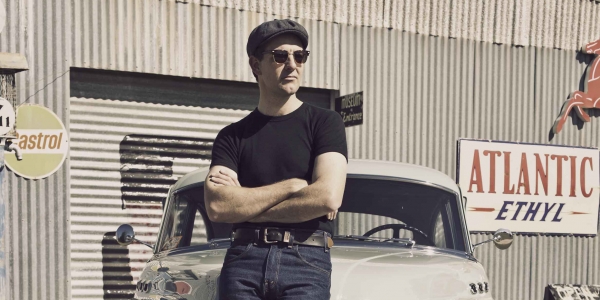“I found myself really bored onstage one night. A lot of my music was really down-tempo. I was already writing pop music in a way, but it wasn’t stuff that I felt would really attract people all that much,” says Simmons, reached on the phone from her Brisbane home.
“I really wanted to challenge myself, because I’d gotten a few reviews that labelled me as too ‘Soundscapey’ and they didn’t think I could be a pop writer. I’m paraphrasing, of course, but that’s what I got from a lot of past reviews. It was a challenge to see if I could do it. I’d always thought I could do it, but I’d never tried. That’s what (It’s Not Like We’re Trying To Move Mountains) became for me.”
The “it” Simmons casually refers to is the nearly all-out transformation into a fully-fledged synth-pop chanteuse. While Simmons’ voice still moves with an elegant grace, she’s crafted a bombastic collection of electronically-charged tracks. While many artists find themselves undergoing changes thanks to an intense relationship with their influences, Simmons carries a different perspective on how the music she was listening to at the time of writing It’s Not Like We’re Trying To Move Mountains influenced her ability to undergo the change.
She lists Lykke Li and El Perro Del Mar as artists she “got into” as she was writing, though Simmons doesn’t adhere to the belief that imitation is the most sincere form of flattery.
“There were a lot of artists that I’d loved for a long time, and you can listen to their records, but you wouldn’t necessarily want to recreate them. I really wanted to make a record that I could listen to.”
As Simmons answers questions, she maintains a self-awareness that complements her ability to undergo such a drastic change in aesthetic. Case in point: the tongue-in-cheek album title, a thinly veiled reference to Simmons stepping away from the process and remembering that, while a focal point of her life, brandishing a new sound isn’t the end-all-and-be-all of Tara Simmons.
“I think the title is a little bit reflective of my ability within the process. I actually don’t think I’m that good at not taking the process too seriously. I was having a conversation with my producer after pre-production, and I mentioned those words. And he just said, ‘That’s it, that’s the title of the album.’ Perhaps I just had to remind myself of that. You’re not trying to move mountains,” she says with ease, “You’re just trying to make songs.”
While she can speak playfully about the making of It’s Not Like We’re Trying To Move Mountains now, there was a time during the recording process when she wondered if the album would ever actually see the light of day.
Pre-production began early in 2011 and Simmons was finally able to close to book on the album in February of 2012. Not for her lack of want however, Simmons instead insists that, no matter how demanding the process was, she couldn’t release a sub-par product.
“We were doing a lot of writing up until the beginning of 2011,” she says. “I did finish the record mid-2011 but I then realised that I wasn’t that happy with it. At first I kind of freaked out and thought that I’d created a monster. But once I calmed down and thought about it, I realised there were a few albums that I wasn’t that happy with. And it was right up into February this year that I was recording new songs to replaced the ones I scrapped.”
Staying the course proved as a big a challenge for Simmons as it was keeping the majority of the album under her hat.
“When you’ve first written and recorded something, you feel good about it. But the longer you sit with something, the more you start to doubt it. I’m happy with the songs I replaced. I think the root of the frustration was not being able to show anyone the record.”
With It’s Not Like We’re Trying To Move Mountains now ready for consumption, Simmons is happy she had the courage of her conviction and, as far as what the album and the future will bring, admits she would, “Be really appreciative of anything that would happen.”
Though the change Simmons underwent on the album may be one her future albums are measured against, what’s most assuring is what Simmons hasn’t changed. She hasn’t sacrificed any of her trademark emotionally-laden lyrics, still letting listeners in to a very personal world. Despite recent changes, that world is a place where feeling still matters more than anything else.
“I realised that the more open I got, the more people would relate to it,” she says. “I wanted people to connect to whatever I was saying and actually feel something.”
BY JOSHUA KLOKE

